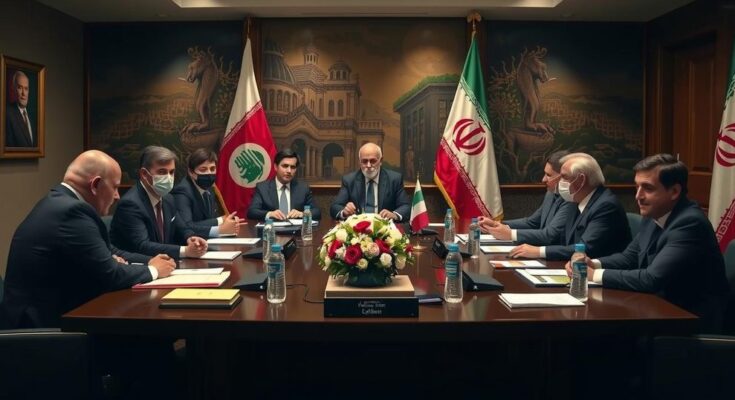Iran has expressed support for Lebanon’s efforts to secure a ceasefire with Israel amid ongoing airstrikes on Hezbollah positions in Beirut. The U.S. is facilitating diplomatic negotiations, reportedly presenting a ceasefire draft to Lebanese leaders. Hezbollah remains armed by Iran, complicating ceasefire talks as Israeli airstrikes continue to inflict casualties and displace thousands. A hopeful stance on ceasefire prospects has been conveyed by Israeli officials, hinting at potential resolutions in the conflict.
On November 15, 2024, Iran reaffirmed its support for the Lebanese government in its negotiations for a ceasefire with Israel, as reported by a senior Iranian official. This statement underscores Iran’s commitment to addressing the ongoing conflict, which has severely affected its ally, Hezbollah. Despite continued Israeli airstrikes on Hezbollah strongholds in Beirut, diplomatic efforts led by the United States are reportedly making progress towards achieving a ceasefire agreement. The ongoing conflict has escalated, with Israel conducting airstrikes for four consecutive days, leading to extensive destruction in southern Beirut. According to reports, U.S. envoy to Lebanon, Jeffrey Feltman, presented a ceasefire draft to Lebanon’s parliament speaker, Nabih Berri, who has Hezbollah’s backing in these negotiations. Berri and Iranian representative Ali Larijani met amid these discussions, with Larijani assuring that Iran is not seeking to undermine the U.S. ceasefire initiative but rather aims to find a resolution that supports Lebanon. Hezbollah, which has been militarily supported by Iran since its inception in 1982, finds itself at a critical juncture as the U.S. administration pushes for de-escalation in the region. Global stakeholders emphasize that any ceasefire must align with UN Security Council Resolution 1701, which requires Hezbollah to relocate weapons and personnel away from the Israeli border—a condition that Israel insists upon in any agreement. In a discussion with Larijani, Lebanon’s caretaker Prime Minister Najib Mikati reiterated the necessity of adhering to Resolution 1701 while demanding an end to ongoing Israeli aggression. This call for support highlights Lebanon’s prioritization of national security amid persistent fears of Israeli incursions following a series of cross-border altercations that began in late September. The situation remains dire for the Lebanese population, with reports indicating over 3,386 casualties due to Israeli attacks since the onset of the conflict. In a show of optimism, Israeli Energy Minister Eli Cohen remarked that ceasefire prospects have never appeared better since hostilities erupted. Furthermore, it is suggested that Netanyahu is eager for an early diplomatic victory in collaboration with President-elect Donald Trump, further complicating the dynamics of the conflict and its potential resolutions.
The ongoing conflict between Hezbollah and Israel has reached a critical point, particularly following the resurgence of hostilities in late September 2023. Hezbollah’s close ties with Iran, which founded the militant group, have made it a significant player in regional geopolitics, complicating Lebanon’s efforts for peace and stability. The U.S.’s active role in facilitating a ceasefire reflects the international community’s concern over the humanitarian impact of the conflict, which has forced over a million Lebanese to flee their homes. UN Security Council Resolution 1701, which ended the last major conflict between Israel and Hezbollah in 2006, provides a framework for negotiations but is contentious among involved parties.
In conclusion, Iran’s backing of Lebanon in its endeavors for a ceasefire with Israel highlights Tehran’s strategic interest in maintaining influence in the region. As diplomatic efforts led by the United States gain traction, the conditions for a ceasefire remain tied to compliance with UN Resolution 1701, while the humanitarian toll of the conflict continues to rise. The complexity of the situation demands careful navigation through political and military landscapes, with significant attention required from international powers to address the urgent humanitarian needs and political stability in Lebanon and its neighboring areas.
Original Source: indianexpress.com




